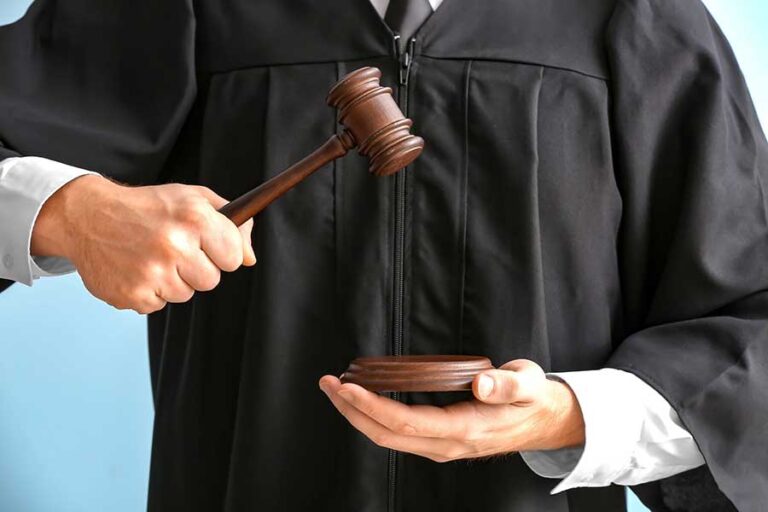Avot 4:7-8
In two juxtaposed mishnayot, Rabbi Ishmael the son of Rabbi Yose communicates four related ethical exhortations primarily intended for judges that also have moral resonance for everyone.
âHe who refrains himself from judgment rids himself of enmity, robbery, and false swearing;Â and he whose heart is presumptuous in giving a judicial decision is foolish, wicked, and arrogantâ (Avot 4:7).
While adjudicating disputes is a necessary responsibility for those qualified, one should not want to judge for the sake of prestige or honor.  Rabbeinu Yonah notes that if there are others that are more qualified, the less experienced judge should defer to them. This suggested hesitancy is due to the fact that the atmosphere in the courtroom tends to be contentious. Conflict, dishonesty, and false testimony are all commonplace characterological challenges. If possible, the judge should promote compromise between the parties, obviating the need for a courtroom.
Other commentaries direct the message to the litigants as well: Do all within your power to avoid court. Refrain from the character trait of âjudgment.â Instead of being exacting, strive to be forgiving and merciful.
In a creative read, Rabbi Abraham J. Twerski suggests the keyword here is âhimselfâ (âatzmoâ). To avoid conflict, a judge should remove ego and personal interest from the case. It is often self-important emotions like pride and a striving for dominance and power that lead to interpersonal conflict.
This explanation helps transition nicely into the second segment of the Mishna, which explicitly relates to arrogance. Maimonides understands this statement as a directive to have a healthy sense of fear when judging a case. Donât be impetuous, overconfident, or self-assured in making a decision.
âHe used to say: Do not judge alone, for none may judge alone save one. And say not âAccept my view,â for they are free but not youâ (Avot 4:8).
One way of holding this bias or overconfidence in check is to follow Rabbi Ishmaelâs advice in the above Mishna, âDo not judge alone.â According to Abarbanel, there is a bigger chance of making mistakes when decisions rest solely in one personâs hands. Similarly, Rabbi Irving Bunim writes that âno matter how qualified you may be, you are still human. Inevitably you may fail to see a whole picture⦠your view may be tinged with some kind of bias⦠Pool your vision with the thoughts of others⦠Several minds working together may come closer to the ideal of perfect justice.â
In his book Sefer HaChaim, Rabbi Chaim ben Betzalel of Friedberg, the older brother of the Maharal, writes that unlike G-d who can judge alone, a human judge will be inherently biased based on his personality. That is why more judges are needed to help erase the individual biases.
The âhungry judge effectâ is one oft-cited study in the behavioral-economics literature that demonstrates the biases and mistakes individual judges can make. Researchers found that Israeli parole board judges make stricter decisions before taking a meal break, and more lenient decisions after eating. The decisions were not being made based on the merits of the case but were subconsciously being impacted by hunger and mental fatigue.
Yet Rabbi Ishmael does not explicitly suggest a practical justification as to why one shouldnât judge alone, but a theological one. Only G-d judges alone; humans should not. While we often try to emulate G-d through the process of Imitatio Dei, this instance seems to be an exception to that rule. G-d is singular and all-knowing, but since we are definitionally limited, we should not try to emulate this aspect of G-dâs grandeur.
Perhaps this ethical message parallels the restrictions placed on a king by the Bible. The verses put strict legal and moral limitations on the king so that he does not become too arrogant. G-d, after all, is the ultimate King.
Generalizing from judges to general ethical advice, the Lubavitcher Rebbe suggests that getting anotherâs perspective is essential for self-improvement. We tend to have self-serving biases in either positive or negative directions that distort our self-assessment. Soliciting the counsel of a trusted confidant is an essential tool for self-growth. Perhaps the same would apply to our judgement of other people as well. Just like we should âjudge every person favorablyâ and ânot judge our peers until we are in their place,â perhaps the message here is to attempt to avoid judging at all. G-d is the ultimate judge of others behavior, and we shouldnât be quick to emulate that characteristic of G-d. Only He has the full accounting. We are inherently biased and limited in our perspective.
The last message of the Mishna is to avoid saying âaccept my view.â Judges who are working in groups should not compel or force their views on the other judges. The potential arrogance and overconfidence of each judge needs to be curbed, even in the context of interacting with other judges.  A collaborative and humble spirit must infuse the decision-making process. This may also be a message about the dangers of groupthink, where one overly powerful personality can impose or sway others to follow their opinions is dangerous. As Rabbi Dr. Eliezer Schnall and Dr. Michael Greenberg have demonstrated in their article âGroupthink and the Sanhedrin: An Analysis of the Ancient Court of Israel Through the Lens of Modern Social Psychology,â the regulations of the judicial system attempted to avoid groupthink. This Mishna would corroborate such an approach.
Based on the teachings of Rabbi Abraham Isaac Kook and his son Tzvi Yehuda Kook, the book Sichat Avot generalizes this message to other situations as well. Particularly in a modern society, imposing and compelling others to accept oneâs opinions is not a wise or helpful approach. Respecting autonomy while demonstrating love, patience, and respect is the virtuous path.


